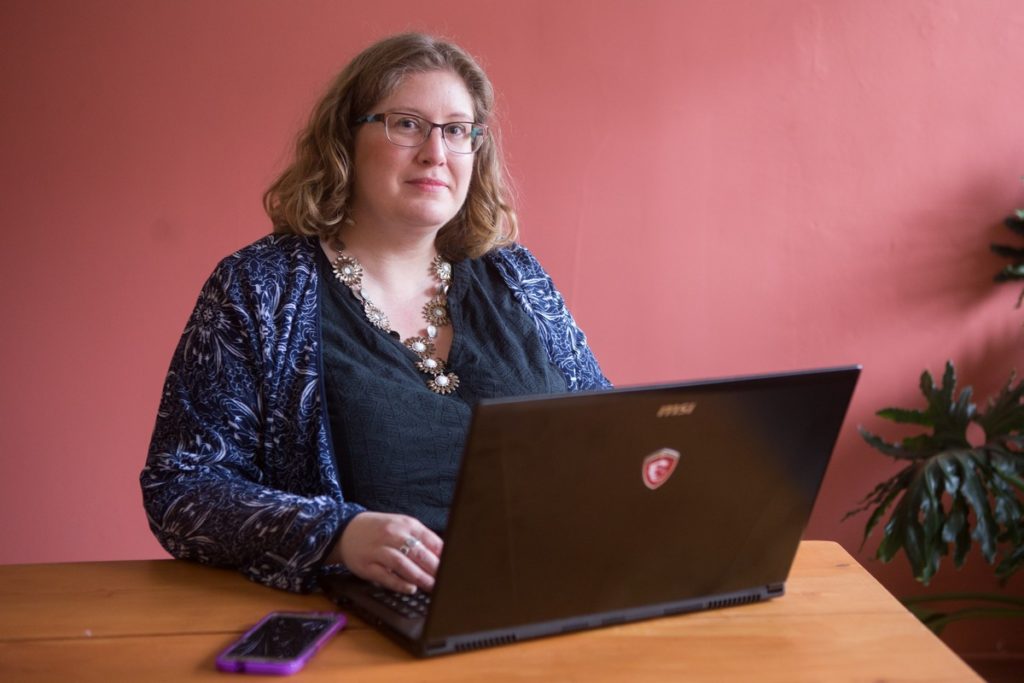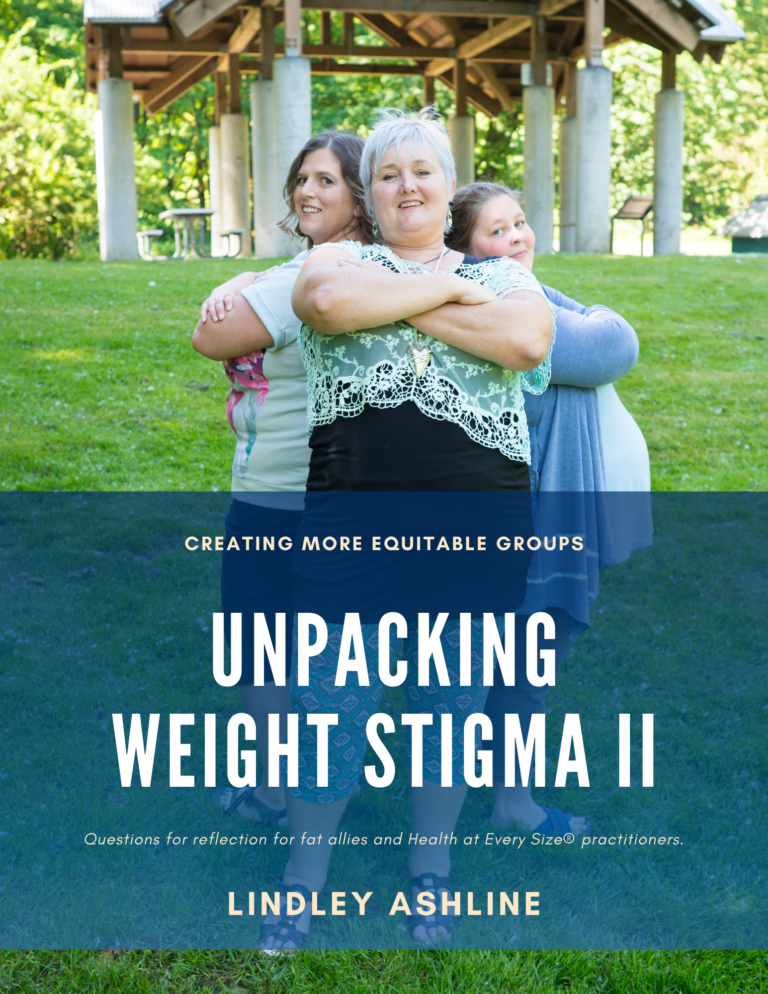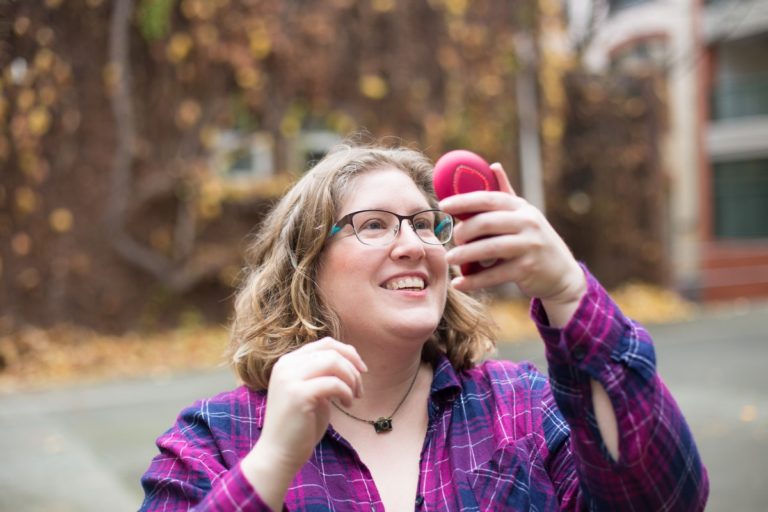Wave to me next time you’re on the field, okay?
I am probably the last person who should be making sports analogies, because I’m also probably the least sporty person on earth. I was pretty good at dodgeball as a kid, and I’m not terrible at Dance Dance Revolution, but as far as team sports? “Lulz,” as the cool kids are saying these days.
But I was irresistibly reminded of sports while reading through the comments on one of Nic McDermid’s recent Instagram posts. Nic is a fierce fat activist and speaker. Her posts are meant to afflict the comfortable, and they usually succeed. (You can support her work here.)
In this particular post, Nic talks about the frustration of watching people in thin bodies speak over and for fat people about weight stigma (and profit from it). In Nic’s words:
“Honestly, if fat people are willing and able to deliver such presentations, we should. Instead, we’re being trampled by thin folks who haven’t grasped the concept of ‘thin people are not the experts on fat people’s experiences.’ I for one, HATE sitting in a room being taught about my lived experience by somebody who has absolutely ZERO clue what it’s like to live in a fat body. …I sincerely hope that many thin folks in the HAES community can understand why constantly stealing the spotlight is so dangerous.”
And as always, always happens when a fat person dares to speak up about this inequity, a constant stream of commenters — some of whom, interestingly, identify as fat — have not only pushed back on behalf of thin saviors, but have twisted and misrepresented Nic’s simple statement above.
The problem is not that thin people are speaking up about weight stigma, of course. The problem is that thin people are shoving aside people with lived experience and taking every opportunity that leads to payment, publicity, and career advancement.
Which is why you don’t see fat folks giving weight stigma workshops most of the time: When we speak, we’re ignored, and the opportunities that would give us platforms are uniformly taken by people with higher levels of size privilege. That’s not okay.
I got tired of having my labor deleted when commenters huffily deleted their original comments and my replies, so I thought I’d offer a little FAQ right here. Here are some of the most common questions that get asked when fat folks speak up on this topic.
Q: So thin people should never speak up on behalf of fat people? Isn’t that unfair and divisive?
A: If I had a quarter for every person who’s accused me of being divisive, I could pay for some media training for a few fat folks. This is a favorite theme of defensive people in thin bodies: By pointing out fatphobia and thin privilege, I am in fact the bigot.
Beyond observing how interesting it is that fat folks are the ones being lectured about creating the divisions that stigmatize and oppress us, that argument isn’t worth dignifying with a response.
But yes, of course thin folks should speak up on behalf of fat folks. I’ve even included a guide below on how to tell when you’re speaking *up* versus speaking *over* us.
Q: Does this mean that thin people shouldn’t talk about weight stigma on their social media?
A: Of course not. We *need* thin allies to speak up. You’re more likely to be listened to and taken seriously. But we also need you to speak *with* us, not *over* us.
Q: Are you saying that thin people should decline paid speaking opportunities and refer them to you? (actual question I’ve been asked)
A: That’s a pretty antagonistic way of putting it. Those opportunities should be referred to fat people when possible, yes. And maybe reconsider implying that asking to be the ones to discuss our lived experience is some kind of greedy marketing ploy.
Q: Have you tried just asking thin speakers to include fat people?
A: Sure I have. And the last time I tried it, the thin person giving (paid) weight stigma workshops condescended to me publicly, informed me that she includes the input of many past colleagues and patients in her materials (without their knowledge or compensation), and then ignored me. And none of my fellow HAES community members who saw the interaction backed me up. Once burned, less likely to keep speaking up.
Q: What if there are no qualified fat people available to speak?
A: Really? None at all? Have you checked the couch cushions?
It’s possible that you’re not seeing qualified fat people because it’s so much more difficult for us to establish platforms and gain the publicity and networking opportunities that make speakers easy to find.
Consider reaching out to someone with lived experience whose online presence is as close a match as you can find, and then do a bit of mentoring or guidance to help them put together a presentation or workshop that matches your needs.
Q: What if there are no fat people in my organization?
A: Really? None at all? Given that a very large percentage of the US population (your country may vary) lives in larger bodies, it’s time to take a look at what is making your organization inhospitable to fat folks. And time to start hiring speakers outside your organization.
A Very Short Guide to Speaking Up for Us vs. Speaking Over Us
Helpful:
– Confronting fatphobia and weight stigma when you see it in conversations and social media posts
– Sharing our posts and supporting our work
– Recommending us for opportunities
– Talking about fatphobia and weight stigma on your social media
– Developing materials on weight stigma with the (compensated) input of fat folks
Not helpful:
– Talking about fatphobia and weight stigma on your social media without ever elevating or sharing actual fat voices or bodies
– Taking paid opportunities to speak about weight stigma
– Taking unpaid opportunities to speak about weight stigma without at least investigating the possibility of bringing in someone with lived experience (and compensating them — DO NOT ask fat folks to labor for you for free)
– Developing materials on weight stigma without the (compensated) input of fat folks
A Quick Guide for Allies
I want to speak for fat people via social media. That’s great! Please do so. Please also elevate fat voices on your social media as often as possible.
I want to speak for fat people during conversations that come up in my personal or professional life. That’s great! Please do so.
I want to speak for fat people via unpaid opportunities within my own organization. When possible, give that opportunity to a fat person. If that’s not possible (such as cases where your voice is the only welcomed voice in the situation), find a person with lived experience to review your materials, and compensate them appropriately.
I want to speak for fat people via paid opportunities inside or outside my organization. Find a qualified fat person and suggest that they be considered instead.
I Told You There’d Be a Sports Analogy
So often, we fatties are met with accusations when we speak up. Maybe if we were nicer, and shut up more around thin people who just want to help, we’d stop making people feel unappreciated who are on the same team!
If your cooperation requires my silent adoration, are you really on my team?
If your cooperation requires me to sit on the bench 100% of the game while you’re on the field, are you really on my team?
Wave to me the next time you’re out there, okay? Or better yet, pass me the damn ball and let me score a goal myself.

Let’s dig deep. Every Monday, I send out my Body Liberation Guide, a thoughtful email jam-packed with resources for changing the way you see your own body and the bodies you see around you. And it’s free. Let’s change the world together.
Hi there! I'm Lindley. I create artwork that celebrates the unique beauty of bodies that fall outside conventional "beauty" standards at Body Liberation Photography. I'm also the creator of Body Liberation Stock and the Body Love Shop, a curated central resource for body-friendly artwork and products. Find all my work here at bodyliberationphotos.com.
- Lindley Ashline
- Lindley Ashline
- Lindley Ashline
- Lindley Ashline
- Lindley Ashline
- Lindley Ashline
- Lindley Ashline
- Lindley Ashline
- Lindley Ashline
- Lindley Ashline
- Lindley Ashline
- Lindley Ashline
- Lindley Ashline
- Lindley Ashline
- Lindley Ashline
- Lindley Ashline
- Lindley Ashline
- Lindley Ashline
- Lindley Ashline
- Lindley Ashline
- Lindley Ashline
- Lindley Ashline
- Lindley Ashline
- Lindley Ashline
- Lindley Ashline
- Lindley Ashline
- Lindley Ashline
- Lindley Ashline
- Lindley Ashline
- Lindley Ashline
- Lindley Ashline
- Lindley Ashline
- Lindley Ashline
- Lindley Ashline
- Lindley Ashline
- Lindley Ashline
- Lindley Ashline
- Lindley Ashline
- Lindley Ashline
- Lindley Ashline
- Lindley Ashline
- Lindley Ashline
- Lindley Ashline
- Lindley Ashline
- Lindley Ashline
- Lindley Ashline
- Lindley Ashline
- Lindley Ashline
- Lindley Ashline
- Lindley Ashline
- Lindley Ashline
- Lindley Ashline
- Lindley Ashline
- Lindley Ashline
- Lindley Ashline
- Lindley Ashline
- Lindley Ashline
- Lindley Ashline
- Lindley Ashline
- Lindley Ashline
- Lindley Ashline
- Lindley Ashline
- Lindley Ashline
- Lindley Ashline
- Lindley Ashline
- Lindley Ashline
- Lindley Ashline
- Lindley Ashline
- Lindley Ashline
- Lindley Ashline
- Lindley Ashline
- Lindley Ashline
- Lindley Ashline
- Lindley Ashline
- Lindley Ashline
- Lindley Ashline
- Lindley Ashline
- Lindley Ashline
- Lindley Ashline
- Lindley Ashline
- Lindley Ashline
- Lindley Ashline
- Lindley Ashline
- Lindley Ashline
- Lindley Ashline
- Lindley Ashline
- Lindley Ashline
- Lindley Ashline
- Lindley Ashline
- Lindley Ashline
- Lindley Ashline
- Lindley Ashline
- Lindley Ashline
- Lindley Ashline
- Lindley Ashline
- Lindley Ashline
- Lindley Ashline
- Lindley Ashline
- Lindley Ashline
- Lindley Ashline
- Lindley Ashline
- Lindley Ashline
- Lindley Ashline
- Lindley Ashline
- Lindley Ashline
- Lindley Ashline
- Lindley Ashline
- Lindley Ashline
- Lindley Ashline
- Lindley Ashline
- Lindley Ashline
- Lindley Ashline
- Lindley Ashline
- Lindley Ashline
- Lindley Ashline
- Lindley Ashline
- Lindley Ashline
- Lindley Ashline
- Lindley Ashline
- Lindley Ashline
- Lindley Ashline
- Lindley Ashline
- Lindley Ashline
- Lindley Ashline
- Lindley Ashline
- Lindley Ashline
- Lindley Ashline
- Lindley Ashline
- Lindley Ashline
- Lindley Ashline
- Lindley Ashline
- Lindley Ashline
- Lindley Ashline
- Lindley Ashline
- Lindley Ashline
- Lindley Ashline
- Lindley Ashline
- Lindley Ashline
- Lindley Ashline
- Lindley Ashline
- Lindley Ashline
- Lindley Ashline
- Lindley Ashline
- Lindley Ashline
- Lindley Ashline
- Lindley Ashline
- Lindley Ashline
- Lindley Ashline
- Lindley Ashline
- Lindley Ashline
- Lindley Ashline
- Lindley Ashline
- Lindley Ashline
- Lindley Ashline
- Lindley Ashline
- Lindley Ashline
- Lindley Ashline
- Lindley Ashline
- Lindley Ashline
- Lindley Ashline
- Lindley Ashline
- Lindley Ashline
- Lindley Ashline
- Lindley Ashline
- Lindley Ashline
- Lindley Ashline
- Lindley Ashline
- Lindley Ashline
- Lindley Ashline
- Lindley Ashline
- Lindley Ashline
- Lindley Ashline
- Lindley Ashline
- Lindley Ashline
- Lindley Ashline
- Lindley Ashline
- Lindley Ashline
- Lindley Ashline
- Lindley Ashline
- Lindley Ashline
- Lindley Ashline
- Lindley Ashline
- Lindley Ashline
- Lindley Ashline
- Lindley Ashline
- Lindley Ashline
- Lindley Ashline
- Lindley Ashline
- Lindley Ashline
- Lindley Ashline
- Lindley Ashline
- Lindley Ashline
- Lindley Ashline
- Lindley Ashline
- Lindley Ashline
- Lindley Ashline
- Lindley Ashline
- Lindley Ashline
- Lindley Ashline
- Lindley Ashline
- Lindley Ashline
- Lindley Ashline
- Lindley Ashline
- Lindley Ashline
- Lindley Ashline
- Lindley Ashline
- Lindley Ashline
- Lindley Ashline
- Lindley Ashline
- Lindley Ashline
- Lindley Ashline
- Lindley Ashline
- Lindley Ashline
- Lindley Ashline
- Lindley Ashline
- Lindley Ashline
- Lindley Ashline
- Lindley Ashline
- Lindley Ashline
- Lindley Ashline
- Lindley Ashline
- Lindley Ashline
- Lindley Ashline
- Lindley Ashline
- Lindley Ashline
- Lindley Ashline
- Lindley Ashline
- Lindley Ashline
- Lindley Ashline
- Lindley Ashline
- Lindley Ashline
- Lindley Ashline
- Lindley Ashline
- Lindley Ashline
- Lindley Ashline
- Lindley Ashline
- Lindley Ashline
- Lindley Ashline
- Lindley Ashline
- Lindley Ashline
- Lindley Ashline
- Lindley Ashline
- Lindley Ashline
- Lindley Ashline
- Lindley Ashline
- Lindley Ashline
- Lindley Ashline
- Lindley Ashline
- Lindley Ashline
- Lindley Ashline
- Lindley Ashline
- Lindley Ashline
- Lindley Ashline
- Lindley Ashline
- Lindley Ashline
- Lindley Ashline
- Lindley Ashline
- Lindley Ashline
- Lindley Ashline
- Lindley Ashline
- Lindley Ashline
- Lindley Ashline
- Lindley Ashline
- Lindley Ashline
- Lindley Ashline
- Lindley Ashline
- Lindley Ashline
- Lindley Ashline
- Lindley Ashline
- Lindley Ashline
- Lindley Ashline
- Lindley Ashline
- Lindley Ashline
- Lindley Ashline
- Lindley Ashline
- Lindley Ashline
- Lindley Ashline
- Lindley Ashline
- Lindley Ashline
- Lindley Ashline
- Lindley Ashline
- Lindley Ashline
- Lindley Ashline
- Lindley Ashline
- Lindley Ashline
- Lindley Ashline
- Lindley Ashline
- Lindley Ashline
- Lindley Ashline
- Lindley Ashline
- Lindley Ashline
- Lindley Ashline
- Lindley Ashline
- Lindley Ashline
- Lindley Ashline
- Lindley Ashline
- Lindley Ashline
- Lindley Ashline
- Lindley Ashline
- Lindley Ashline
- Lindley Ashline
- Lindley Ashline
- Lindley Ashline
- Lindley Ashline
- Lindley Ashline
- Lindley Ashline
- Lindley Ashline
- Lindley Ashline
- Lindley Ashline
- Lindley Ashline
- Lindley Ashline
- Lindley Ashline
- Lindley Ashline
- Lindley Ashline
- Lindley Ashline
- Lindley Ashline
- Lindley Ashline
- Lindley Ashline
- Lindley Ashline
- Lindley Ashline
- Lindley Ashline
- Lindley Ashline
- Lindley Ashline
- Lindley Ashline
- Lindley Ashline
- Lindley Ashline
- Lindley Ashline
- Lindley Ashline
- Lindley Ashline
- Lindley Ashline
- Lindley Ashline
- Lindley Ashline
- Lindley Ashline
- Lindley Ashline
- Lindley Ashline
- Lindley Ashline
- Lindley Ashline
- Lindley Ashline
- Lindley Ashline
- Lindley Ashline
- Lindley Ashline
- Lindley Ashline
- Lindley Ashline
- Lindley Ashline
- Lindley Ashline
- Lindley Ashline
- Lindley Ashline
- Lindley Ashline
- Lindley Ashline
- Lindley Ashline
- Lindley Ashline
- Lindley Ashline
- Lindley Ashline
- Lindley Ashline
- Lindley Ashline
- Lindley Ashline
- Lindley Ashline
- Lindley Ashline
- Lindley Ashline
- Lindley Ashline
- Lindley Ashline
- Lindley Ashline
- Lindley Ashline
- Lindley Ashline
- Lindley Ashline
- Lindley Ashline
- Lindley Ashline
- Lindley Ashline
- Lindley Ashline
- Lindley Ashline
- Lindley Ashline
- Lindley Ashline
- Lindley Ashline
- Lindley Ashline
- Lindley Ashline
- Lindley Ashline
- Lindley Ashline
- Lindley Ashline
- Lindley Ashline
- Lindley Ashline
- Lindley Ashline
- Lindley Ashline
- Lindley Ashline
- Lindley Ashline
- Lindley Ashline
- Lindley Ashline
- Lindley Ashline
- Lindley Ashline
- Lindley Ashline
- Lindley Ashline
- Lindley Ashline
- Lindley Ashline
- Lindley Ashline
- Lindley Ashline
- Lindley Ashline
- Lindley Ashline
- Lindley Ashline
- Lindley Ashline
- Lindley Ashline
- Lindley Ashline
- Lindley Ashline
- Lindley Ashline
- Lindley Ashline
- Lindley Ashline
- Lindley Ashline
- Lindley Ashline
- Lindley Ashline
- Lindley Ashline
- Lindley Ashline
- Lindley Ashline
- Lindley Ashline
- Lindley Ashline
- Lindley Ashline
- Lindley Ashline
- Lindley Ashline
- Lindley Ashline
- Lindley Ashline
- Lindley Ashline
- Lindley Ashline
- Lindley Ashline
- Lindley Ashline
- Lindley Ashline
- Lindley Ashline
- Lindley Ashline
- Lindley Ashline
- Lindley Ashline
- Lindley Ashline
- Lindley Ashline
- Lindley Ashline
- Lindley Ashline
- Lindley Ashline
- Lindley Ashline
- Lindley Ashline
- Lindley Ashline
- Lindley Ashline
- Lindley Ashline
- Lindley Ashline
- Lindley Ashline
- Lindley Ashline
- Lindley Ashline
- Lindley Ashline
- Lindley Ashline
- Lindley Ashline
- Lindley Ashline
- Lindley Ashline
- Lindley Ashline
- Lindley Ashline
- Lindley Ashline
- Lindley Ashline
- Lindley Ashline
- Lindley Ashline
- Lindley Ashline
- Lindley Ashline
- Lindley Ashline
- Lindley Ashline
- Lindley Ashline
- Lindley Ashline
- Lindley Ashline
- Lindley Ashline
- Lindley Ashline
- Lindley Ashline
- Lindley Ashline
- Lindley Ashline
- Lindley Ashline
- Lindley Ashline
- Lindley Ashline
- Lindley Ashline
- Lindley Ashline
- Lindley Ashline
- Lindley Ashline
- Lindley Ashline
- Lindley Ashline
- Lindley Ashline
- Lindley Ashline
- Lindley Ashline
- Lindley Ashline
- Lindley Ashline
- Lindley Ashline
- Lindley Ashline
- Lindley Ashline
- Lindley Ashline
- Lindley Ashline
- Lindley Ashline
- Lindley Ashline
- Lindley Ashline
- Lindley Ashline
- Lindley Ashline
- Lindley Ashline
- Lindley Ashline
- Lindley Ashline
- Lindley Ashline
- Lindley Ashline
- Lindley Ashline
- Lindley Ashline
- Lindley Ashline
- Lindley Ashline
- Lindley Ashline
- Lindley Ashline
- Lindley Ashline
- Lindley Ashline
- Lindley Ashline
- Lindley Ashline
- Lindley Ashline
- Lindley Ashline
- Lindley Ashline
- Lindley Ashline
- Lindley Ashline
- Lindley Ashline
- Lindley Ashline
- Lindley Ashline
- Lindley Ashline
- Lindley Ashline
- Lindley Ashline
- Lindley Ashline
- Lindley Ashline
- Lindley Ashline
- Lindley Ashline
- Lindley Ashline
- Lindley Ashline
- Lindley Ashline
- Lindley Ashline
- Lindley Ashline
- Lindley Ashline
- Lindley Ashline
- Lindley Ashline
- Lindley Ashline
- Lindley Ashline
- Lindley Ashline
- Lindley Ashline
- Lindley Ashline
- Lindley Ashline
- Lindley Ashline
- Lindley Ashline
- Lindley Ashline
- Lindley Ashline
- Lindley Ashline
- Lindley Ashline
- Lindley Ashline
- Lindley Ashline
- Lindley Ashline
- Lindley Ashline
- Lindley Ashline
- Lindley Ashline
- Lindley Ashline
- Lindley Ashline
- Lindley Ashline
- Lindley Ashline
- Lindley Ashline
- Lindley Ashline
- Lindley Ashline
- Lindley Ashline
- Lindley Ashline
- Lindley Ashline
- Lindley Ashline
- Lindley Ashline
- Lindley Ashline
- Lindley Ashline
- Lindley Ashline
- Lindley Ashline
- Lindley Ashline
- Lindley Ashline
- Lindley Ashline
- Lindley Ashline
- Lindley Ashline
- Lindley Ashline
- Lindley Ashline
- Lindley Ashline
- Lindley Ashline
- Lindley Ashline
- Lindley Ashline
- Lindley Ashline
- Lindley Ashline
- Lindley Ashline
- Lindley Ashline
- Lindley Ashline
- Lindley Ashline
- Lindley Ashline
- Lindley Ashline
- Lindley Ashline
- Lindley Ashline
- Lindley Ashline
- Lindley Ashline
- Lindley Ashline
- Lindley Ashline
- Lindley Ashline
- Lindley Ashline
- Lindley Ashline
- Lindley Ashline
- Lindley Ashline
- Lindley Ashline
- Lindley Ashline
- Lindley Ashline
- Lindley Ashline
- Lindley Ashline








